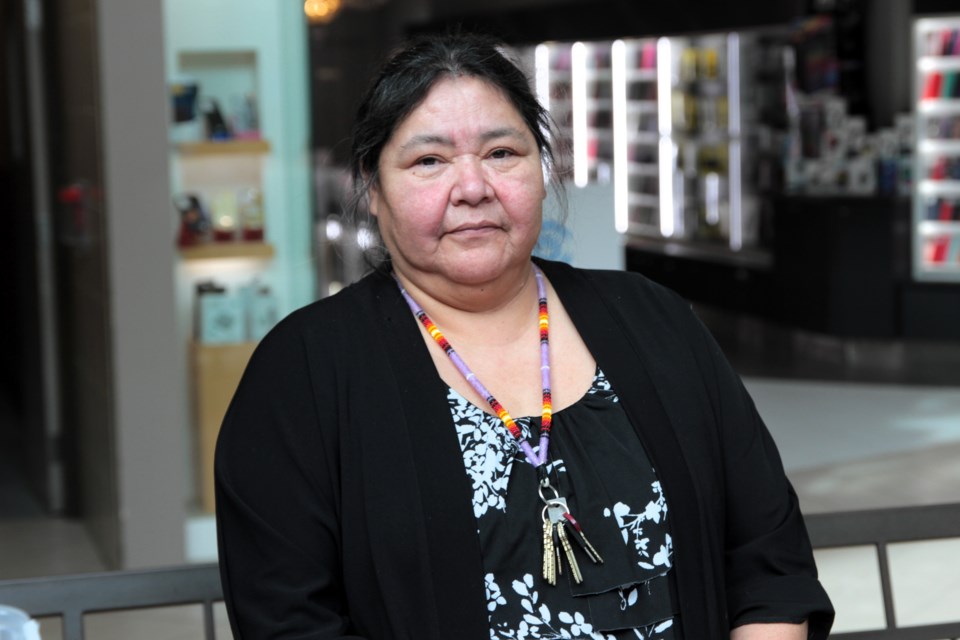THUNDER BAY – Human trafficking is a much more complex issue than one might think.
It’s often described as an abduction where an individual grabs a person, more often a female, off the street and holds them captive.
Although there are cases where this scenario happens, the co-chair of the Thunder Bay Coalition to End Human Trafficking, Cindy Paypompee, said this is only one scenario of how bad actors claim their victim.
To educate the public about human trafficking, the Thunder Bay Coalition to End Human Trafficking held an awareness event at Intercity Shopping Centre.
“It's not an abduction. Some people might think it's an abduction, but it's not. It's calculated,” said Paypompee.
“The other thing is like sometimes people mistake smuggling as human trafficking, but it's not because when it's smuggling, the person is paying somebody to get somewhere. When they get to that place, they're able to leave.”
“But with human trafficking, they're taken across the borders and are kept because they owe a debt to pay off the money that is agreed upon, and sometimes that person can't pay it, so they have to work for it.”
Paypompee told Newswatch that traffickers would prey on vulnerable people, including the homeless or First Nations youths who come to the city for school.
She said traffickers use psychological and emotional manipulation to control an individual to perform sexual acts.
To obtain this control, traffickers will use social media to initiate contact and befriend those lost in the big city.
“I spoke with people up north who have their kids come to Thunder Bay for school, so that's an example where they're new to the city, they don't know how people can be if they make friends, so that's a vulnerability if you make the wrong friend,” said Paypompee.
“We have 13 and 14-year-olds that come to Thunder Bay for school. A lot of people don't know the safety precautions that they take with their devices. Being online, like on social media, especially like Snapchat, where someone who could be just sitting around here can know which people are on Snapchat and they know what they're looking for.”
“So, they know the movements of somebody vulnerable so then they can make friends with the person, manipulate them into thinking that they're their friend, and that's how it starts. It's slow.”
Nishnawbe Aski Police Service (NAPS) serves 34 Nishnawbe Aski Nation (NAN) communities, a majority of which are remote.
They had a booth at the awareness event where they were educating the public about what their service does to protect survivors of human trafficking.
Carly Drewes, detective sergeant at Nishnawbe Aski Police Service, said, “a huge issue, we'll say for our regions specifically, is not being educated on what human trafficking looks like. For a lot of people in bigger urban areas, it looks far different than it would say in our remote north.”
She stated that human trafficking can take the form of unhealthy relationships and the lack of knowledge on consent.
Drewes said it starts with exploitation. A person flies into Thunder Bay for a medical appointment, school, or even shopping, and they fall victim to trafficking by stating publicly online that they are in the city.
“They've just been chatting with someone who seems so nice, and then they come out to the city and not realize they've been groomed this entire time, and now they're being trafficked,” said Drewes.
“We deal with a lot of things. Not understanding what relationships look like and not understanding that a trafficker could look like an unhealthy relationship, an unhealthy boyfriend who's just maybe a little bit possessive,” said Drewes.
“You think you're in a relationship with someone, and you're not recognizing first of all that that's an unhealthy thing that he shares you with his friends or that he makes you handle his debts.”
“You're used in order to serve his debts or do his dirty work essentially or do illegal behaviours that you wouldn't normally otherwise be exposed to be doing,” she added.
Drewes stated that upon receiving a call from a survivor of human trafficking, NAPS immediately contacts them and puts them in touch with services that can help.
“We essentially act as advocates and get them started in processes that they never knew about or wouldn't know how to access. We will follow them through an entire process, whether it's through the criminal justice system or just through their healing journey,” said Drewes.
Beendigen Anishinabe Women’s Crisis Home and Family Healing Agency offers counselling sessions and culturally sensitive programming.
“We provide like a place where they can go to if they don't feel safe in Thunder Bay. We go ask our sister shelters around our region to see if they can provide safety for some of the victims as well,” said Paypompee.
She also said that people can access the Canadian human trafficking hotline and the Thunder Bay Coalition to End Human Trafficking.
